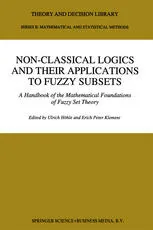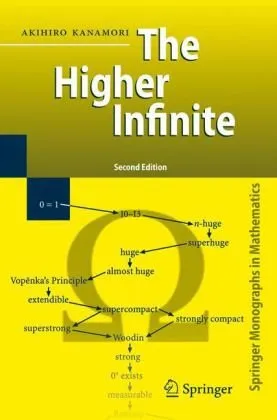Non-Classical Logics and their Applications to Fuzzy Subsets: A Handbook of the Mathematical Foundations of Fuzzy Set Theory
4.0
بر اساس نظر کاربران

شما میتونید سوالاتتون در باره کتاب رو از هوش مصنوعیش بعد از ورود بپرسید
هر دانلود یا پرسش از هوش مصنوعی 2 امتیاز لازم دارد، برای بدست آوردن امتیاز رایگان، به صفحه ی راهنمای امتیازات سر بزنید و یک سری کار ارزشمند انجام بدینکتاب های مرتبط:
معرفی کتاب
کتاب «Non-Classical Logics and their Applications to Fuzzy Subsets: A Handbook of the Mathematical Foundations of Fuzzy Set Theory» اثری ارزشمند از نویسندگان Ulrich Höhle و Erich Peter Klement است که به صورت جامع و دقیق به بنیانهای ریاضی و منطقی نظریه مجموعههای فازی پرداخته است. این کتاب یکی از منابع کلاسیک در زمینه منطقهای غیرکلاسیک و کاربرد آنها در مجموعههای فازی محسوب میشود و مورد استفاده گسترده محققان، دانشجویان و علاقهمندان به ریاضیات فازی، علوم کامپیوتری و هوش مصنوعی قرار گرفته است.
خلاصهای دقیق از کتاب
هدف اصلی این کتاب بررسی عمیق ارتباط بین منطقهای غیرکلاسیک و مفاهیم فازی و معرفی ابزارهای ریاضیاتی لازم برای تحلیل این رابطه است. نویسندگان با استفاده از زبان دقیق ریاضیات، ساختارها و مدلهای بنیادین منطق فازی را معرفی کرده و به کاربردهایی از قبیل تصمیمگیری، استنتاج و کنترل هوشمند پرداختهاند.
در بخشهای ابتدایی کتاب، مفاهیم پایهای مانند مجموعههای فازی، Membership Functions، و عملیات روی آنها معرفی میشود. سپس نویسندگان به معرفی منطقهای غیرکلاسیک مانند Intuitionistic Logic، Modal Logics و Multi-Valued Logics میپردازند و نشان میدهند که چگونه این منطقها به مدلسازی مفاهیم فازی کمک میکنند.
در ادامه، ساختارهایی مانند Algebraic Frameworks for Fuzzy Logic و Category-Theoretic Approaches توضیح داده شدهاند که ابزارهای اساسی برای تحلیل و به کارگیری نظریه مجموعههای فازی به حساب میآیند. این کتاب همچنین موضوعاتی مانند الگوریتمهای بهینهسازی و استفاده از منطق فازی در کاربردهای عملی نظیر سیستمهای خبره و Robotics را شرح میدهد.
موضوعات کلیدی کتاب
- معرفی دقیق مجموعههای فازی و Membership Functions
- بررسی منطقهای غیرکلاسیک و ارتباط آنها با نظریه فازی
- تحلیل مدلهای ریاضی در منطق فازی
- توضیح نرمافزارها و الگوریتمهای مبتنی بر اصول فازی
- کاربردهای عملی در هوش مصنوعی و سیستمهای خبره
نقلقولهای معروف از کتاب
"Fuzzy logic is not about imprecision; rather, it is a rigorous mathematical language for dealing with formalized notions of uncertainty."
"Non-classical logics offer a framework where human reasoning's inherent vagueness finds a natural, elegant representation."
چرا این کتاب اهمیت دارد؟
این کتاب درک عمیقی از نظریه مجموعههای فازی و نقش منطقهای غیرکلاسیک در آن ارائه میدهد. از این رو، برای هر کسی که به دنبال شناخت دقیق ابزارهای ریاضی در حوزه علوم فازی یا کاربردهای آن در سیستمهای دینامیکی و هوش مصنوعی است، این کتاب یک مرجع بینظیر محسوب میشود. همچنین، نشاندهنده یک دیدگاه اصولی به حل مسائل واقعی از طریق روشهای منطقی و فازی است.
علاوه بر این، این اثر از حیث ادغام عمیق نظریه و عمل جایگاه متمایزی دارد. یعنی، خواننده نه تنها تئوریهای بنیادین را میآموزد بلکه منابع متعددی برای بررسی و مطالعه کاربردهای عملی ارائه میشود. این امر تأثیری بسزایی در پیشرفت تحقیقات نوین دارد.
Introduction to "Non-Classical Logics and their Applications to Fuzzy Subsets: A Handbook of the Mathematical Foundations of Fuzzy Set Theory"
"Non-Classical Logics and their Applications to Fuzzy Subsets" explores the intersection of logic, mathematics, and fuzzy set theory, providing a rigorous and comprehensive foundation for those interested in delving into the fascinating world of non-classical logics. This book serves as a crucial resource for researchers, academics, and practitioners who are eager to understand how various non-classical logical systems serve as a backbone for the development and application of fuzzy subsets.
The text emphasizes the role of non-classical logics—such as many-valued logic, intuitionistic logic, and modal logic—in forming the underpinnings of fuzzy set theory. These logical systems extend classical logic, offering nuanced tools to better model and manage uncertainty, vagueness, and imprecision in a variety of decision-making and computational contexts.
By presenting mathematical principles, alongside logical frameworks, this book guides the reader step-by-step through theoretical concepts and practical applications. Its approachable yet detailed presentation ensures accessibility for newcomers while offering advanced insights for seasoned experts in logic, mathematics, or fuzzy set theory.
Detailed Summary of the Book
The book begins with foundational chapters dedicated to classical and non-classical logic systems. Emphasis is placed on how these logical frameworks diverge from strict binary interpretations of true and false, embracing the continuum of truth values that characterizes fuzzy logic. Readers are introduced to essential concepts such as propositional logic, predicate logic, and algebraic logic, before advancing into their "non-classical" counterparts.
As the book progresses, it delves into the primary mathematical structures underpinning fuzzy subset theory—lattice theory, order theory, and topology. The integration of these mathematical tools creates a robust framework for analyzing uncertainty and approximation within the scope of fuzzy reasoning.
Later chapters provide a systematic exploration of fuzzy subsets, illustrating their utility in modeling real-world systems that require adaptive, approximate reasoning. Applications span from artificial intelligence, control systems, and decision support to broader questions of epistemology and human reasoning.
Each chapter is carefully structured to provide a balance between theory and application, ensuring that readers not only grasp abstract concepts but also understand their relevance to computational and scientific challenges.
Key Takeaways
- Understanding the mathematical and logical foundations of fuzzy set theory.
- Comprehension of non-classical logics, including many-valued, modal, and intuitionistic logics.
- Insights into how non-classical logics address vagueness, uncertainty, and imprecision in both natural and artificial systems.
- Knowledge of the practical applications of fuzzy subsets in areas like artificial intelligence and decision-making.
- Ability to bridge abstract mathematical concepts with real-world challenges requiring fuzzy reasoning and logical flexibility.
Famous Quotes from the Book
"Classical logic, with its rigid structure and binary outcomes, serves as the architecture of certainty. Non-classical logics open the doors to uncertainty, offering a more human, adaptive, and dynamic intellectual framework."
"Fuzzy subsets go beyond mathematics; they represent a philosophy—a way to embrace ambiguity and model the real world's inherent uncertainty."
"The elegance of non-classical logic lies in its departure from absolutes. It teaches us the art of reasoning in the gray, where truths are neither black nor white."
Why This Book Matters
At its core, "Non-Classical Logics and their Applications to Fuzzy Subsets" addresses one of the most fundamental challenges of modern science and philosophy: managing uncertainty. From artificial intelligence to human reasoning, our ability to make informed decisions often hinges on approximations, partial truths, and complex trade-offs. This book equips its readers with the tools to model such intricate systems through the lens of fuzzy logic and its rich mathematical foundations.
Furthermore, this work is pivotal due to its interdisciplinary approach. By bringing together elements of logic, mathematics, and applied science, it offers a holistic resource that encourages deeper understanding and innovation in areas like computation, control theory, and decision analysis. Its emphasis on clarity, structure, and rigor ensures that it will serve as a cornerstone reference for decades to come.
For those who aim to expand their grasp of mathematical reasoning and explore the fascinating applications of fuzzy subsets, this book is an indispensable companion. Whether you're a mathematician, computer scientist, philosopher, or engineer, you'll find invaluable insights within its pages. It's not just a book on fuzzy logic—it's a guide to embracing complexity and learning to think beyond the binary.
دانلود رایگان مستقیم
شما میتونید سوالاتتون در باره کتاب رو از هوش مصنوعیش بعد از ورود بپرسید
دسترسی به کتابها از طریق پلتفرمهای قانونی و کتابخانههای عمومی نه تنها از حقوق نویسندگان و ناشران حمایت میکند، بلکه به پایداری فرهنگ کتابخوانی نیز کمک میرساند. پیش از دانلود، لحظهای به بررسی این گزینهها فکر کنید.
این کتاب رو در پلتفرم های دیگه ببینید
WorldCat به شما کمک میکنه تا کتاب ها رو در کتابخانه های سراسر دنیا پیدا کنید
امتیازها، نظرات تخصصی و صحبت ها درباره کتاب را در Goodreads ببینید
کتابهای کمیاب یا دست دوم را در AbeBooks پیدا کنید و بخرید
1316
بازدید4.0
امتیاز50
نظر98%
رضایتنظرات:
4.0
بر اساس 0 نظر کاربران
"کیفیت چاپ عالی بود، خیلی راضیام"
Questions & Answers
Ask questions about this book or help others by answering
No questions yet. Be the first to ask!



